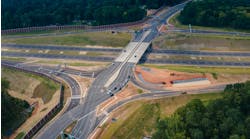Island Avenue from Elmwood Avenue to Suffolk Avenue in Philadelphia had a troubling history of pedestrian and vehicle crashes.
Previously identified as part of the city’s High Injury Network with over 24,000 vehicles passing through daily, the need for upgrades was clear. The Island Avenue Roadway Improvements project, aligned with the city’s Vision Zero plan, sought to address these safety concerns and improve the overall functionality of the corridor.
Before construction began, Island Avenue faced numerous operational challenges. The southbound traffic lanes crossed over the SEPTA trolley tracks, leading to congestion and safety risks. To mitigate these issues, the project team relocated the trolley crossover to a section of road with lower traffic volumes, effectively reducing potential conflicts between vehicles and trolleys.
The project was comprehensive, involving a $16.7-million investment that included resurfacing the road, upgrading traffic signals and installing new ADA-compliant curb ramps.
A key component of the redesign was the closure of the northbound frontage road, which allowed for the creation of green spaces and a mixed-use trail for pedestrians and cyclists. This enhanced safety for road users but also contributed to the community's aesthetic and recreational offerings.
To facilitate the changes, the intersection of Island Avenue and Lindbergh Boulevard underwent a transformation. It was simplified into a standard four-way intersection, improving traffic flow and reducing crossing distances for pedestrians.
Additionally, Lindbergh Boulevard saw curb line modifications and updated lighting, all aimed at enhancing safety and visibility for all travelers.
The design process was collaborative, involving multiple stakeholders including Philadelphia’s Department of Streets, JMT as a subconsultant and Gilmore and Associates for drainage and utility plans.
Teamwork was vital, especially given the urban setting of the project, where grading and drainage posed unique challenges. The team held biweekly meetings to ensure that each aspect of the project aligned with the others, fostering a spirit of cooperation that was essential for success.
Outward community engagement played a crucial role in shaping the project. An open house hosted by the team attracted residents and provided a platform for them to voice their concerns and suggestions.
Flyers were distributed, and social media announcements invited participation. Feedback collected during these sessions directly influenced design decisions, particularly regarding safety enhancements at the Lindbergh intersection.
Safety wasn’t only a top priority in the design, but in the construction process as well. The team employed high-early strength concrete to minimize disruptions, allowing work to be completed with minimal lane restrictions. Over 280,000 hours of work were carried out without an accident, underscoring the commitment to safety on site.
The Island Avenue improvement project represents more than just an upgrade to infrastructure; it reflects a commitment to the community’s well-being. By improving safety, reducing congestion and accommodating diverse modes of transportation, this initiative will serve residents and visitors alike for years to come.
Project: Island Avenue Roadway Improvements
Location: Philadelphia, Pennsylvania
Owners: Philadelphia Department of Streets
Designer: Johnson, Mirmiran & Thompson, Inc.
Contractor: Tony DePaul and Son
Cost: $16.7 million
Length: 1.798 miles



